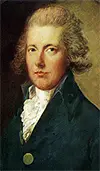William Pitt the Elder
William Pitt the Elder was one of Great Britain's most famous Prime Ministers, guiding the country through the Seven Years War and raising Britain to the pinnacle of world power. He was born on Nov. 15, 1708, in Westminster, London, one of seven children born to Robert and Harriet Pitt. Both his father and grandfather were Members of Parliament. He attended the prestigious Eton school in 1719–1726. The following year saw him at Trinity College, Oxford. He didn't stay there long, moving to study at Utrecht University, in the Dutch Republic. 
He joined the army and served for a time in Northampton, not seeing combat duty. His commanding officer was Lord Cobham, whom Pitt would later see as political mentor. Pitt was elected a Member of Parliament for Old Sarum in 1735 and, a member of the Whig Party, quickly became a strong opponent of the current prime minister, Robert Walpole. Pitt was critical of the government's actions with regard to Spain, which culminated in the War of Jenkins' Ear. For his diligence, Pitt was named Paymaster of the Forces in 1746, during the War of the Austrian Succession. He moved on from Old Sarum, winning election to seats in Seaford in 1747 and Aldborough in 1754. Also in that year, he married Hester Grenville; the couple had five children, one of whom was the famous William Pitt the Younger. Pitt was named Secretary of State in June 1757. He was thus in office during the first part of the Seven Years War. King George II died in 1760, and his grandson (also named George) succeeded him. The new king, George III, wanted to talk peace. Pitt advised it against it and, confronted with the king's opposition, resigned as Secretary of State, in October 1761. By the time he left, however, British forces had made great gains in North America, in what was there called the French and Indian War, and in India, West Africa, and the West Indies. Indeed, when the wars ended, both in 1763, Britain was in supreme position among the belligerents, with a worldwide empire and a strong navy and army to protect it. 
He briefly returned to office in 1766, as Lord Privy Seal, which effectively made him Prime Minister. Also at this time, he gained a title, becoming the first Earl of Chatham. A modest fellow by nature, he had steadfastly refused to accept a title, earning him the moniker of the "Great Commoner." He was Prime Minister during a particularly turbulent time in North America. His Chancellor of the Exchequer, Charles Townshend, had initiated the Townshend Acts, a series of taxes and other measures designed to help encourage the North American colonists to help pay off the debut incurred after the war. Just a year before, Parliament had rescinded the Stamp Act in response to great outcry from the American colonists. But the Crown still needed money and so Townshend, with Pitt's tacit understanding, pushed the measures through Parliament. Pitt resigned from Cabinet in 1768 and did not return. Throughout his career, he was known for his brilliant oratory. He gave many speeches in Parliament. He said that his favorite author was Demosthenes, the famed orator of Ancient Greece. Still a member of Parliament as the situation in North America worsened, he urged caution and conciliation, rather than the punitive measures that Lord North and others were pushing. Once the Revolutionary War, he warned that the Americans would not surrender and, in fact, could not be conquered. He died on May 11, 1778, in Hayes, Middlesex. He was mourned in both Britain and North America. |
|
Social Studies for Kids
copyright 2002–2024
David White




